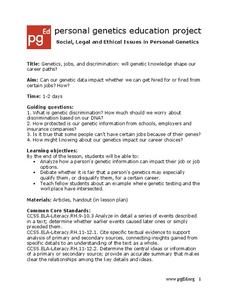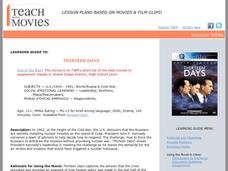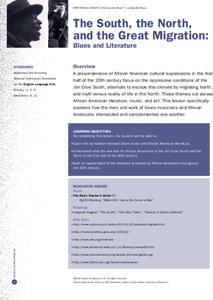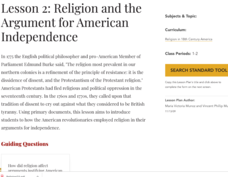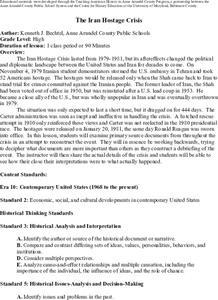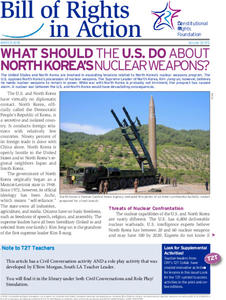iCivics
Why Government?
Why do people create governments? Where did we get our ideas about government? This is a fantastic introductory lesson for your American government class that begins by reviewing the philosophies of Thomas Hobbes and John Locke in...
iCivics
Limiting Government
While this instructional activity includes several nice worksheets to identify and discuss the various limits on government (i.e. a constitution, the rule of law, separation of powers, consent of the governed, etc.), its main value lies...
Weebly
Infographic Project
This multi-faceted, progressive project includes an array of activities for analyzing and evaluating a theme of American history. Learners begin by constructing a timeline of events in United States history using Google docs, create a...
Brandenburg Studies
The Timeline Project
This is a great idea for any social studies classroom to incorporate throughout the year as an ongoing project! Line your walls with a continuous strip of butcher paper to design a large timeline that you can add to as you cover...
Loudoun County Public Schools
World War I Causes Project
After completing this detailed and well-designed project, your young historians will be well-versed in their explanations of the reasons that various countries joined World War I! Learners design a picture book covering seven primary...
Personal Genetics Education Project
Genetics, Jobs and Your Rights
Your class will read an overview of the Genetic Information Nondiscrimination Act, passed in 2008 and address the question of whether or not genetic information should be used to influence our career paths. In jigsaw style, they then are...
Austin Independent School District
History Mapping
This is a great activity to have on hand to help your young historians summarize major historical events. Learners identify key players and contextual information, major episodes of the event, and any resolutions or lasting impressions.
Curated OER
Revolution! The Atlantic World Reborn
This resource is rich with primary and secondary source material regarding major events in the Atlantic world during the Age of Revolution. While there are suggested classroom activities toward the beginning of the resource, its true...
Teach with Movies
Learning Guide to Thirteen Days
While Thirteen Days is a fantastic film to use in the classroom in reference to the Cold War and the Cuban missile crisis, it is important to take care to effectively and properly incorporate its contents into your curriculum. This...
The New York Times
Revolt! Comparing Historical Revolutions
What elements are needed to have a revolution? How do historical revolutions from across the globe and generations compare with one another? This is an excellent activity that incorporates group work, source analysis, and an engaging...
Houghton Mifflin Harcourt
Renaissance and Reformation Chapter Review
Review key terms, vocabulary, sequence of events, and themes from the Renaissance and Reformation with this textbook chapter review. While designed by a publisher for a particular text, this resource can be incorporated into any...
Curated OER
The South, the North and the Great Migration: Blues and Literature
Here is a complex lesson plan that interweaves the history of the Jim Crow South and the Great Migration with the study of poetry, art, and blues music from the Harlem Renaissance. The plan helps young historians develop a deep...
American Library Association
Creating 21st Century Superheroes
Create 21st century learners by utilizing technology and library databases. Scholars explore the concept of comic books as literature and create a superhero who could uniquely solve a 21st century global issue. Databases such as SIRS are...
National Endowment for the Humanities
Kennewick Man: Science and Sacred Rights
"Have respect for the dead!" Scholars investigate how science and religion often clash. As they look into the laws of science and the laws of religion, the legal ramifications at the federal level of both play into an argument they...
National Endowment for the Humanities
Lesson 2: Religion and the Argument for American Independence
Young scholars examine how religion affected arguments justifying American independence. They read and analyze primary source documents, and write an essay analyzing how Americans used religious arguments to justify revolution against a...
National Endowment for the Humanities
Lesson 1: The First Great Awakening
High schoolers examine the First Great Awakening and how it affected religious belief in colonial America. They read and analyze primary source documents, explore various websites, and write a five-paragraph essay examining the beliefs...
Center for History Education
The Iran Hostage Crisis
While the Iranian Hostage Crisis was a watershed moment, few history classes take on the complex series of events leading up to it. Using declassified documents, including a hostage's diary, young historians create their own reports to...
Center for History Education
Debating Social Security: Understanding and Evaluating the Social Security Act of 1935
With throngs of Americans out of work and hungry, Franklin D. Roosevelt made the bold move to establish a social safety net with programs such as Social Security. The move was—and still is—controversial. Using documents from the 1930s,...
National Endowment for the Humanities
Creating the Office of the Presidency
The United States needed an executive power, but it wanted to avoid a monarchy. Using James Madison's notes on the Constitutional Convention, young historians look at the juggling act the Founding Fathers did to create a role for the...
National Endowment for the Humanities
The Question of Representation at the 1787 Convention
While the Constitution is considered enshrined today, its current form is the result of haggling at a secret convention in 1787. Using transcripts from the meetings and various plans as drafted by the delegates, class members unpack the...
National Endowment for the Humanities
The Road to the Constitutional Convention
After defeating the most powerful nation in the world, the United States had to deal with its own weaknesses in the Articles of Confederation. Activities in the lesson include analyzing primary sources from the Founding Fathers to...
Constitutional Rights Foundation
What Should the US Do About North Korea's Nuclear Weapons?
North Korea, a shadowy nation distrustful of America, is working on a nuclear weapons program. What should the United States do? The question has plagued American presidents for years, but now young scholars get to make their...
Stanford University
King Philip's War
King Philip's War was the crescendo of a violent period between the Pequot and English colonists. Using documents from English settlers, including a contemporary report on the conflict, learners explore the little-known period. They then...
Stanford University
Boston Massacre
The Boston Massacre was a propaganda victory for those protesting British rule over the American colonies. By using images from Patriots, as well as the testimony of witnesses, scholars consider what may have happened on that fateful day...







